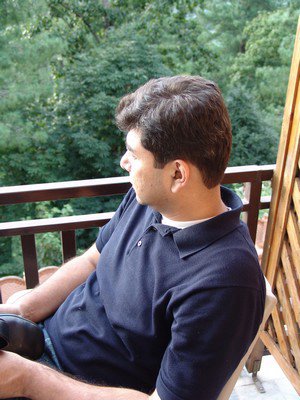The Geometry of God by Uzma Aslam Khan

Time for a book review, more to follow, two more books that I am reading these days.
I had heard about Uzma's earlier books and promptly forgotten about them. It was only when I found out that she was going to read from her book at The Second Floor that I read up on her and attended the recital. I think I was intrigued by her writings in various newspapers and wanted to hear more of what she had to say. So I gathered a few friends and arrived at the venue.
Before this turns into a review of TSF, which is bound to follow, I would say this, I like The Second Floor and would like to keep visiting the place and attend the various things they do.
Uzma signed my copy, and we chit chatted for a few minutes, she thought I was just there to get the book signed and leave, but being unfamiliar with the etiquette of book signings (since this was my first one), I wasn't sure when that would happen. So anyway, she read a few selected pages from the book. Maybe it was the crowd, that didn't pick up on the humour in some parts, or maybe the crowd was as inexperienced as I was with these things, the reading was a bit tedious. There were a few questions at the end, regarding the fact that the book was published in India and not Pakistan, and about some of the characters. Nothing too exciting.
Note to self: I will have read the book before going to the next recital so that I can enjoy it more.
Now on to the book. It wasn't an easy read. I am suddenly seeing all these books by people who grew up during the Zia years like I did. While I was happily oblivious to everything that went on around me, and only finding out now how bad it really was, and also because we are reaping what we had sown all those years ago, it seems like an awakening of sorts.
The Geometry of God is about a lot of things. It has an underlying and mostly dormant identity crisis, of being different from an ethnic as well as gender perspective. Both of these were pushed to the forefront in the eighties, the creation of an ethnicity based political movement and not to forget, the Islamization by Zia, which meant side lining women by the famous Hadood Ordinance, for example.
The other thing is about how the system of education was affected during this time. This included how history was taught, how Islamiat was changed to fit with the then current requirements of believing in Jihad. This served another purpose, to help with the Jihad happening next doors in Afghanistan. Most importantly, this book talks about evolution and tries to bring the evolution vs. creation debate to us.
In this last thing, Uzma doesn't fare too well. Her protagonist Zahoor is too mild mannered a man to be a zealot about anything. He belongs to an almost extinct breed of people who were able to deal with science and philosophy without conflict. The kind of people who I wish we had more of. Even Amal, the main character, is not a fundamentalist scientist. They suffer in silence, while the world around them crumbles. Thats what real life is like, I suppose.
Nobody takes Zahoor seriously, and even when Amal makes the all important discovery, it really doesn't change anything. It is only because the "Creation Party" and Noman need someone to oppose, that Zahoor gets caught in this cultural revolution. Which can never be a good thing.
So the book could be a political comment as well.
All in all, good read.
Labels: Literature


0 Comments:
Post a Comment
<< Home